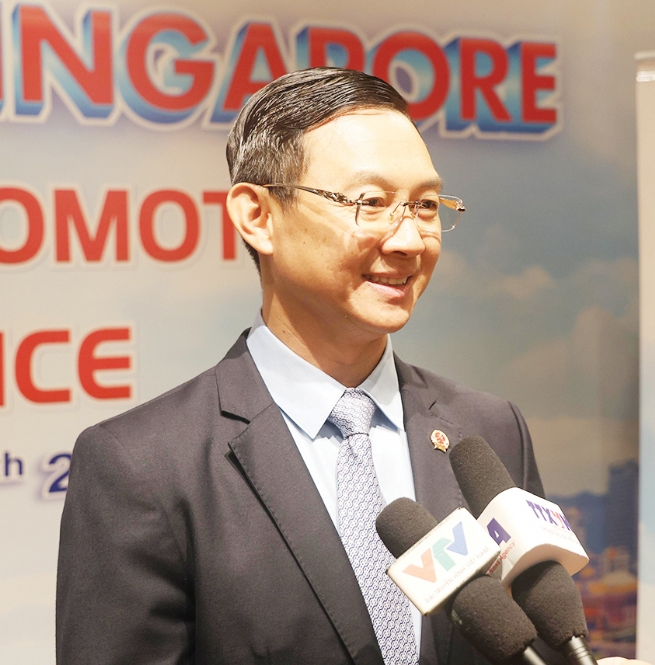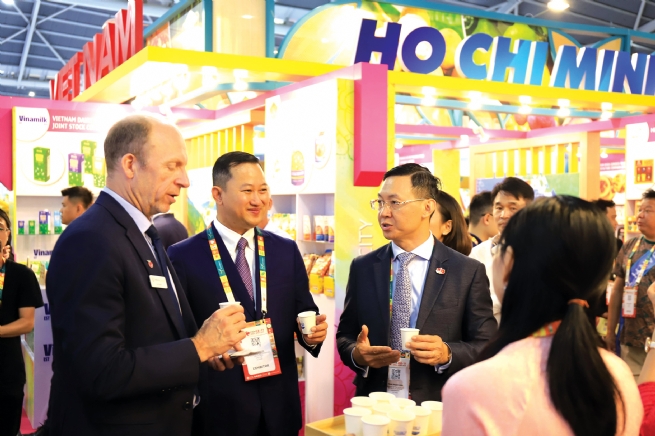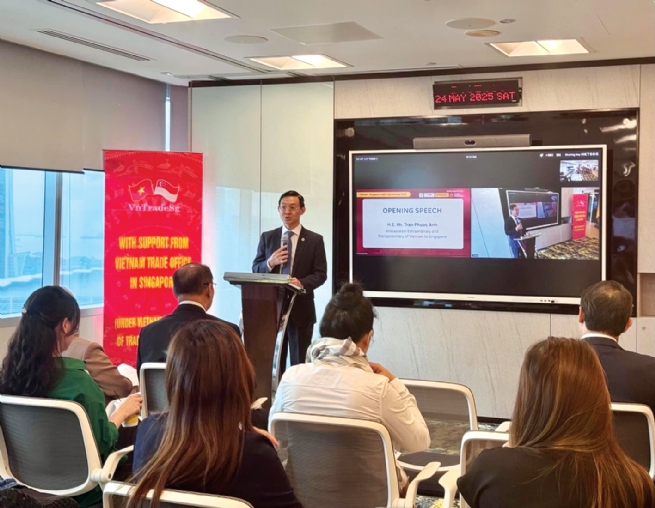8:05:40 AM | 8/8/2025
The elevation of Vietnam-Singapore relations to the Comprehensive Strategic Partnership in March 2025 marked a strategic turning point after more than 50 years of diplomatic ties. Vietnamese Ambassador to Singapore Tran Phuoc Anh emphasized three key drivers behind this bilateral cooperation: strong political and economic trust, a green and digital development vision, and tangible business-to-business connectivity.
 |
With concrete initiatives such as the Vietnam–Singapore Innovation Centre (VSII), the low-emission Vietnam–Singapore Industrial Park (VSIP) model, and the Vietnam–Singapore Economic Connectivity Agreement’s Action Program for 2025–2030, the two countries are building a new foundation for cooperation geared toward green value chains, innovation, and sustainable development.
What does the upgrade of Vietnam-Singapore relations to a Comprehensive Strategic Partnership mean for bilateral economic cooperation, and what are the key factors driving this strategic step forward?
The upgrade of Vietnam-Singapore relations to the Comprehensive Strategic Partnership in March 2025 during General Secretary To Lam’s visit to Singapore marked strategic progress, ushering in the highest cooperation framework between the two countries and laying a solid foundation for deep, substantive, and sustainable bilateral economic cooperation.
Three key factors have driven this progress:
First, a solid cooperation foundation with high political trust and similar stances on strategic issues such as regional peace, ASEAN’s centrality, and the rule of international law.
Second, deepening economic ties, exemplified by Singapore being the second largest investor in Vietnam with over 4,160 projects and a total registered capital of over US$86.46 billion, and the successful VSIP model. Bilateral trade reached nearly US$24 billion in 2024, signifying substantial untapped potential.
Third, a shared vision for sustainable development, innovation, and green digital transformation, with a focus on cooperation in areas such as renewable energy, digital economy, smart cities, and startups.
The new framework facilitates both sides to strengthen supply chain connectivity, invest in emerging sectors, and effectively leverage new-generation free trade agreements such as the Comprehensive and Progressive Agreement for Trans-Pacific Partnership (CPTPP) and the Regional Comprehensive Economic Partnership (RCEP), aiming for Environmental, Social, and Governance (ESG) standards in green and sustainable development.
In the context of globally prioritized shift to digital transformation and green growth, which areas do you believe will create substantial breakthroughs in economic cooperation between the two countries during the 2025-2030 period?
With the elevation of relationship to the Comprehensive Strategic Partnership starting in 2025, Vietnam and Singapore have a favorable foundation to foster substantive economic cooperation till 2030, especially in three key areas.
First, digital economy and innovation cooperation, with a focused emphasis on AI, big data, blockchain, fintech, and e-commerce. Singapore is a regional financial and innovation hub while Vietnam has a market of nearly 100 million people and a young tech-savvy workforce. Initiatives like the Vietnam-Singapore Innovation Center (VSII) or digital technology zones within future VSIPs will be effective bridges for capital flows, technology, and high-quality human resources.
Second, green growth and sustainable economy cooperation under the Green-Digital Economy Partnership framework established in 2023, centering on renewable energy, sustainable infrastructure, green finance, circular economy, and human resource training. Singapore is strong at clean technology and green finance while Vietnam has great potential for solar, wind, and biomass energy, especially for offshore wind power.
Third, the development of green, smart, and low-emission industrial parks. The network of VSIP projects is moving toward a new model that incorporates digital technology, energy efficiency, water reuse, and waste treatment according to ESG standards, aligned with Vietnam's sustainable industrial orientation.

Vietnamese Ambassador Tran Phuoc Anh and other delegates at the FHA–Food & Beverage 2025 trade expo in Singapore, April 2025
Amid fiercer regional competition for FDI flows, what advantages does Vietnam need to leverage to attract more high-quality capital from Singapore?
Vietnam needs to leverage and enhance several core competitive advantages to maintain its attractiveness to Singaporean investors.
First and foremost, it is necessary to maintain macroeconomic and political stability - a fundamental factor that helped Vietnam to achieve 7.04% growth in 2024 despite global instability. Next is to accelerate investment in strategic infrastructure such as Long Thanh Airport, high-speed railway, inter-regional expressways, and metro systems while developing green logistics, low-emission industrial parks, and smart seaports.
In addition, administrative reform, digitalization of investment procedures, and stronger legal protection also need to be prioritized. Vietnam has the advantage of a young workforce, but it needs to focus on developing high-quality human resources through international standard training, especially in STEM fields, technology, and engineering.
Finally, it needs to effectively utilize bilateral cooperation frameworks such as the Comprehensive Strategic Partnership, the Green-Digital Economy Action Plan, and the VSIP network to create a reliable and sustainable investment ecosystem.

Vietnamese Ambassador Tran Phuoc Anh speaks at the Vietnam-Singapore Halal Trade Seminar, May 2025
Looking ahead to the next five years, what do you believe the business communities of both countries need to do to effectively carry out the Vietnam-Singapore Action Program in 2025-2030?
First of all, there needs to be a shift from a “cooperation to seize opportunities” mindset to a “cooperation to create values” mindset. This means that instead of just focusing on traditional trade and investment projects, businesses should actively build long-term strategic linkages in such spheres as innovation, green technology, sustainable finance, and human resource training. Forms of cooperation like public-private partnerships (PPP), research & development (R&D) joint ventures, or cross-national innovation centers need to be strongly promoted.
Additionally, it is crucial to actively support key initiatives of both governments, such as the Green-Digital Economy Partnership, the new-generation VSIP model, or startup ecosystem connections. These concrete programs are opening up deep cooperation opportunities and require active engagement and high sense of responsibility from businesses. Priority should be given to sustainable development strategies, especially integrating ESG standards into business operations, including carbon emission reduction, clean energy use, and digital transformation.
An effective cooperation platform also needs to be built on the foundation of transparency, respect for the law, and the ability to fulfill commitments. Vietnamese businesses need to further improve governance capacity and digitalize production, logistics, and financial processes while Singaporean companies need to better understand the legal environment, business culture, and local specifics in Vietnam to ensure effective and long-term investment.
Finally, all parties need to maximize the connecting roles of representative agencies and industry associations such as the Embassy of the Socialist Republic of Vietnam in Singapore, Enterprise Singapore, the Singapore Business Federation (SBF), and the Vietnam Chamber of Commerce and Industry (VCCI) to share information, build trust, and expand substantive cooperation networks. If the business communities of both countries act with a strategic mindset, a spirit of partnership, and social responsibility, the 2025-2030 Action Program will become an important catalyst for new breakthroughs in Vietnam-Singapore economic cooperation in the digital and sustainable development age.
Thank you very much!
|
The Vietnamese Embassy in Singapore - Connector in Bilateral Economic Cooperation Organizing investment, trade and tourism promotion events: Coordinating with Vietnamese localities to organize forums, workshops, and connect with Singaporean businesses. Examples include promotional activities launched by Da Nang, Ca Mau, and Khanh Hoa in the first six months of 2025. Leading business delegations for field visits: Supporting Singaporean investors to understand the Vietnamese market, especially agricultural products, technology, and innovation. Coordinating on-site promotional programs in Singapore: Typical examples include the Vietnam Fruit and Vegetable Festival (July 2025), the Halal Products Workshop, and assistance for Vietnamese businesses participating in sector-specific trade fairs. Providing ongoing support for cooperation: Connecting Singaporean investors with Vietnamese partners, resolving issues, and ensuring effective project implementation. Contact: Embassy of the Socialist Republic of Vietnam in Singapore |
By Thu Huyen, Vietnam Business Forum